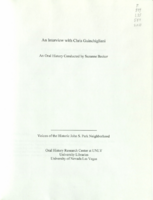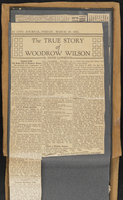Search the Special Collections and Archives Portal
Search Results

Transcript of interview with Chris Guinchigliani by Suzanne Becker, July 20, 2007
Date
Archival Collection
Description
Text

Photograph of fire's destruction at dam worker housing site, Williamsville (Nev.), March 1931
Date
Archival Collection
Description
Image

Jill Roberts oral history interview: transcript
Date
Archival Collection
Description
Oral history interview with Jill Roberts conducted by Barbara Tabach and Claytee D. White on March 20, 2018 for the Remembering 1 October Oral History Project. In this interview, Jill Roberts discusses her position as the CEO of the Trauma Intervention Program (TIP) of Southern Nevada. She also delves into her part-time work at the coroner's office as a death investigator and discusses her personal background in Las Vegas, Nevada after she moved to the city in 1977. She describes the role TIP had during the aftermath of the October 1, 2017 mass shooting, where well-trained volunteers were dispatched to hotels, hospitals, and anywhere else the survivors reached in order to provide emotional and practical support. Throughout the interview, Roberts emphasizes that the assistance provided to those in a traumatic event depends on each individual's needs. She shares a few examples of what the TIP volunteers had helped with after the shooting, including listening to the survivors' stories as well as providing information on the situation, helping separated loved ones find each other, arranging travel for some survivors to go back to their homes, and procuring clothes and shoes for those who needed them. Roberts also discusses the gratitude TIP had received after the shooting, including the thank you cards sent by Sandy Hook High School.
Text
Mary Jane Griffith Reiter Papers
Identifier
Abstract
The Mary Jane Griffith Reiter Papers date from 1919 to 1964. The papers document Nevada history and her family’s business and civic work; they contains her grandmother's will, a ledger detailing the costs and expenses for rental properties, and reports and minutes from the Colorado River Commission. It also includes a 1964 bibliography of materials on Nevada.
Archival Collection
Hyman Gold Papers
Identifier
Abstract
The Hyman Gold Papers (1935-2004) primarily document the career of Las Vegas, Nevada performer Hyman Gold, and consist of newspaper clippings from various engagements, correspondence, and fliers. Materials also include handwritten musical scores and reel to reel tapes, both from his personal and professional life.
Archival Collection
Ronzone, Richard James, 1917-1989
Richard “Dick” J. Ronzone (1917-1989) was active in the local politics and civic affairs of Las Vegas, Nevada, serving as a Clark County Commissioner, a Nevada State Assemblyman, and a member of the University Board of Regents. He inherited and managed his family's retail store which dated back to the early 1900s. Ronzone also helped develop the Municipal Golf Course and was active in the Elks Lodge, Rotary Club, Veterans Of Foreign Wars, Reserve Officers Association, and the Boulder Dam Area Council of the Boy Scouts of America.
Person

Transcript of interview with David Rohn by David G. Schwartz, October 20, 2016
Date
Archival Collection
Description
Text

Diane Meireis oral history interview: transcript
Date
Archival Collection
Description
Oral history interview with Diane Meireis conducted by Claytee D. White on November 06, 2017 for the Remembering 1 October Oral History Project. In this interview, Meireis discusses her experience at the 1 October shooting. She remembers hearing gunfire, the confusion in the crowd, and finding a safe place to hide. Meireis describes the collaboration of strangers, and feeling guilt for not being able to help others as she escaped the venue. Lastly, Meireis discusses her opinions of firearms.
Text


